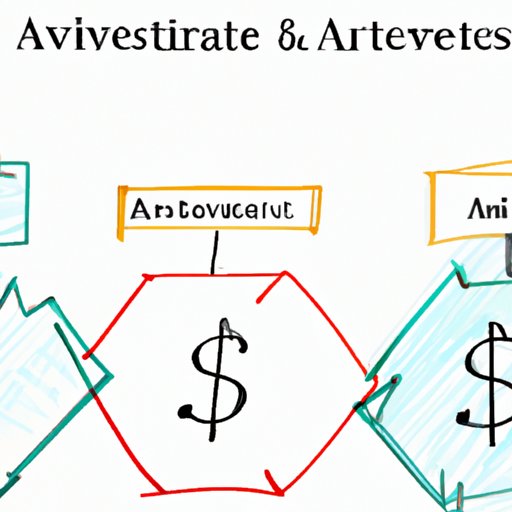Introduction
Alternative investments are financial instruments that offer an opportunity to diversify your portfolio beyond traditional investments such as stocks, bonds, and cash. These investments can provide a unique way to gain exposure to different asset classes, sectors, and markets. While there are potential risks associated with any type of investment, alternative investments can also offer attractive returns when used correctly.
A Guide to Understanding Alternative Investment Strategies
Alternative investments come in a variety of forms, each with its own set of benefits and risks. Here’s a look at some of the most popular strategies:
Equity-based Strategies
Equity-based strategies involve investing in stocks, mutual funds, and exchange-traded funds (ETFs). These investments can be used to gain exposure to different markets and industries, and they can provide potential for long-term growth. Equity-based strategies can also be used to hedge against market volatility.
Fixed-income Strategies
Fixed-income strategies involve investing in debt securities such as corporate bonds, government bonds, and municipal bonds. These investments can provide steady income in the form of interest payments, and they can be used to manage risk by providing stable returns.
Real Estate Strategies
Real estate strategies involve investing in physical property, such as residential or commercial real estate. This type of investment can provide potential for capital appreciation, as well as income from rent payments. Real estate investments can also be used to diversify a portfolio and hedge against market swings.
Private Equity Strategies
Private equity strategies involve investing in privately held companies. These investments can provide potential for significant returns, but they can also be risky due to their lack of liquidity and transparency. Private equity investments can also be difficult to value and may require significant research and due diligence.
Hedge Fund Strategies
Hedge fund strategies involve investing in professionally managed funds that use a variety of strategies to generate returns. These investments can provide potential for higher returns than traditional investments, but they can also be volatile and risky. Hedge funds typically require large minimum investments and charge high fees.

Comparing Different Types of Alternative Investments
When evaluating alternative investments, it’s important to consider the potential risks and rewards, liquidity, and tax implications. Here’s a look at some key factors to consider:
Risk/Reward Considerations
Alternative investments can potentially provide higher returns than traditional investments, but they can also be more risky. It’s important to understand the potential risks associated with each type of investment and weigh them against the potential rewards.
Liquidity Considerations
Alternative investments can often be illiquid, meaning it can be difficult to convert them into cash quickly. This can be a concern if you need to access your money in a hurry, so it’s important to consider the liquidity of any potential investments.
Tax Implications
Tax implications can vary depending on the type of alternative investment. It’s important to understand the tax implications before investing, as they can have a significant impact on your overall returns.

Investing in Alternative Assets: What You Need to Know
When investing in alternative assets, it’s important to do your research and understand the potential risks and rewards. Here are some key things to keep in mind:
Researching Potential Investments
It’s important to carefully research any potential investments before committing your money. Make sure you understand the potential risks and rewards, fees and expenses, and any other relevant information.
Diversifying Your Portfolio
Diversification is key when investing in alternative assets. Don’t put all your eggs in one basket; instead, spread your investments across different asset classes and sectors to reduce risk and maximize potential returns.
Assessing Fees and Expenses
Fees and expenses can have a significant impact on your overall returns. Be sure to understand the fees associated with any potential investments and factor them into your decision-making process.

An Introduction to Alternative Investment Opportunities
There are many different types of alternative investments available to investors. Here’s a look at some of the most popular:
Exchange Traded Funds (ETFs)
ETFs are similar to mutual funds, but they trade on exchanges like stocks. They provide a way to gain exposure to different markets and sectors, and they typically have low fees and expenses. ETFs can be used to diversify your portfolio and help manage risk.
Futures and Options
Futures and options are derivatives that allow investors to speculate on the future price of an asset. These investments can be risky and can provide potential for significant losses, so they should only be used by experienced investors.
Commodities
Commodities are physical goods such as gold, silver, oil, and natural gas. These investments can provide potential for returns, but they can also be volatile and risky. They’re best suited for experienced investors with a high tolerance for risk.
Structured Products
Structured products are synthetic investments that are created using a mix of debt securities, derivatives, and other instruments. These investments can provide potential for higher returns, but they can also be complex and risky. Structured products should only be used by experienced investors.
Precious Metals
Precious metals such as gold, silver, platinum, and palladium can be used as an alternative investment. These investments can provide potential for capital appreciation and can act as a hedge against inflation. Precious metals can also be bought and sold easily.
Conclusion
Alternative investments can provide a unique way to diversify your portfolio and gain exposure to different markets and sectors. However, these investments can also be risky and complex, so it’s important to understand the potential risks and rewards before investing. With careful research and due diligence, alternative investments can be a valuable addition to any portfolio.
(Note: Is this article not meeting your expectations? Do you have knowledge or insights to share? Unlock new opportunities and expand your reach by joining our authors team. Click Registration to join us and share your expertise with our readers.)
